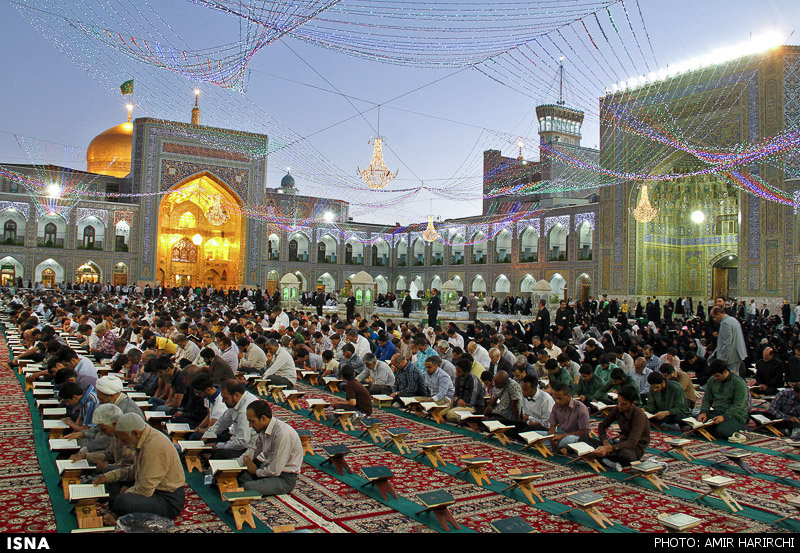-

The Holy Qur'an is the last but the most comprehensive Heavenly Book revealed through the archangel Gabriel to the noble Prophet of God (PBUH). Qur'an is a book of guidance and salvation in this world and in the Hereafter. Therefore, the Muslims should endeavor to learn, understand its contents and act in accord with its Divine teachings in order to attain salvation in this world and in the Hereafter.
Introduction
Qur’an is the everlasting miracle of the Holy Prophet of Islam, Hazrat Muhammad (PBUH), that was revealed over a period of twenty-three years through archangel Gabriel. It consists of 114 chapters (i.e. Suwar). According to a popular opinion among the Quran scientists, 86 of these chapters are considered to be Meccan (i.e. Makki) while the remaining 28 chapters are referred to as Medinan chapters (Madani).
Reciting the Qur’an
Interestingly, Qur’an is a universal and an everlasting Heavenly book, which is meant neither for a specific generation nor a particular set of people . Rather, it is for all people and for every generation. The messages of the Qur’an are relevant to the past, present and the future generations. When recited and reflected upon its verses, the Qur'an opens the eyes and the minds of the reciters to the past, present and future events. In other words, one who learns and understands Qur’an will be able to understand correctly the past, the present and the future events.
The Qur’an says:
الَّذِينَ آتَيْنَاهُمُ الْكِتَابَ يَتْلُونَهُ حَقَّ تِلَاوَتِهِ أُولَـٰئِكَ يُؤْمِنُونَ بِهِ وَمَنْ يَكْفُرْ بِهِ فَأُولَـٰئِكَ هُمُ الْخَاسِرُونَ
Those to whom We have given the Book follow it as it ought to be followed: they have faith in it. As for those who deny it—it is they who are the losers. (Qur’an 2: 121)
The Messenger of God (PBUH) said:
“The most superior worship of my nation is the reading of Qur’an”[1]
In a nutshell, the Qur’an is a Divine message to humanity. As Muslims, we must endeavor to understand the contents of the message sent to us and learn its correct recitation. On a daily basis, we should imbibe the habit of reciting several pages or at least a page of the Qur’an. In addition, a proper reflection upon the verses of the Qur'an has crucial effects on the soul and life of the reciter. Therefore, we should endeavor to reflect on and act in accordance with its verses.
The Messenger of God (PBUH) said:
“One who reads the Qur’an but does not act according to it, the Lord will resurrect him as blind[2]”
Memorizing the Qur’an
There are several traditions from the Holy Prophet (PBUH) and his pure Household (AS), which encourage the Muslims to memorize the Qur’an and mention its rewards. For example, Imam Ja’far Sadiq (AS) reported the Holy Prophet (PBUH) to have said:
“The bearers (i.e. memorizers) of the Qur’an are the mystics of the people of Paradise[3]”
The Commander of the faithful, Imam Ali (AS) said:
“Whoever memorizes the Qur’an, and abides by (all) what it considered to be lawful and keeps away from (all) what it considered to be unlawful, Allah will put him into Paradise[4]”
Likewise, Imam Ja’far Sadiq (AS) also said:
“The memorizer of the Qur’an who acts according to its teachings will be amongst the honored Angels of God[5]”
Thus, based on these traditions, it can be concluded that the memorizers of the Qur’an are respected and honored by Allah and they will be rewarded with being housed in Paradise on the Day of Judgement. Likewise, memorizing the Qur'an is one of the highly rewarding acts in Islam. The Prophet (PBUH) and the Infallible Imams of Ahlul-Bayt (AS) have encouraged the Muslims on this recommendable act.
If you want to memorize the Qur'an, here is some helpful advice:
- Get a personal Qur’an with a very good lettering and always carry it with you.
- Use only this Qur'an to memorize.
- Look for a good reciter among those International Quran reciters. Follow the recitation of this reciter only.
- Create a timetable for your memorization based on your daily schedule.
- Follow strictly the designed timetable and in cases of any failure, always make up for it.
- At first, listen to the chosen recitation of the selected portion to be memorized two or three times. (NOTE: just listen, do not repeat with the reciter).
- Thereafter, follow the reciter in the recitation (i.e. read with the reciter).
- Then, read a chosen number of verses two or three times from the Qur’an by yourself.
- Try to repeat those selected verses from memory two or three times.
- Next day, before starting the memorization, recollect and repeat those verses memorized in the previous day.
- If possible, try to memorize under the supervision of a competent Quran teacher.
- If possible, try to start the memorization in groups of two or three people, so that you can test each other.
References:
[1] . Al-Hindi, Kanzul Ummal, Vol. 1, P. 511, Hadith No: 2265.
[2] . Shi’ri, Jame al-Akhbar, Vol. 1
[3] . Kulayni, Al- Kafi, Vol. 2, P. 606, Hadith 11.
[4] . Hakimi, Al- Hayat, Vol. 2, P. 236
[5] . Kulayni, Al- Kafi, Vol. 2, P. 603, Hadith 2.



